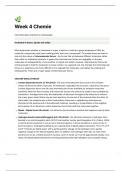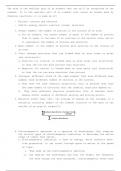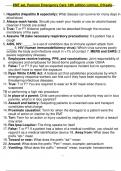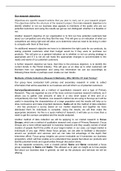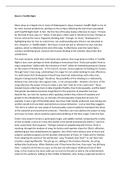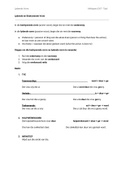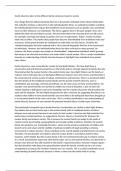Lecture 1: Introduction
What is philosophy?
Philosophy is the study of the fundamental nature of reality, existence, and our knowledge thereof.
→ Socrates: If one is familiar with a topic, one should be able to define it. His objective was to show
professionals that they often don’t have a clue about their field of study.
Philosophy is about asking the right questions to criticize self-evidently assumed notions.
Aporia: not knowing what the answer is= the starting point for philosophy: defining what is mostly based
on assumptions.
It is asking for essential characteristics of a phenomenon in order to be able to define it: find out
necessary conditions for it and look for common parts
Philosophy is always open: one can always criticize answers and there is no definite truth in phenomena
since there are always openings for new information.
Why is philosophy important?
Importance of philosophical reflection on basic concepts:
- Basic concepts of definitions in our minds structure the way we see the world and how we
experience things in the world.
- Philosophy helps you: it makes one aware of presupposed concepts and it guides how you look
at the world
- It enables to assess whether phenomena fall under a concept or not: critically assess if
phenomena still fall in categories: determine whether to broaden concepts
Importance of Philosophy of Science in enabling a critical attitude
- Philosophy of science is about how science must be conducted to obtain reliable knowledge of
the world.
- It helps to critically assess your field of science: It enables to think more critically about the role
of science: what is legitimate to claim?
- It deals with questions such as: Is there such a thing as the scientific method?, Can theories ever
be proven true? (Or false?), Do empirical laws about social (economic) life exist?, Can science be
value-free and politically unbiased?, Should it be value- free?
Ethics in enabling a critical attitude
- Ethics is systematic reflection on moral questions (‘What is the right thing to do?’) and on
relevant values, duties and virtues: basis for responsible practices
- Ethical perspective: normative, impartiality, universal pretention, argumentative, engagement
- Goal is to raise questions to definitions to find out what a concept is about and to specify it
more.
What is philosophy?
Tendency to identify essential characteristics of the content of key concepts (meaning of the content)
Ask:
,What -is questions (essentia)
To create a definition which states what is necessary as well as what is sufficient for something to come
under a certain concept.
Go beyond dictionary definitions: Meaning of key concepts(connotation and denotation) and their
implications
Structure of what-is questions:
What is ... X?
→ Conversation of prevailing opinions.
→ Look for counter -examples or exceptions and question the meaning of concepts in current definitions
→ Adjust definition of key concept and so on...
One univocal meaning or only family resemblances?
How-is questions (existentia)
Defining the existential characteristics: what does X do.
Look for:
- The meaning of relation: What role does the phenomenon have in life and how it relates to the
world around you
- The meaning of executions: see it as something meaningful to you: what does this concept
mean to me? What does it mean to be a part of this concept?
One asks these questions in order to broaden the defined concept. This helps to assess whether
phenomena fall under the concept or not and this basic questioning of concepts allows a critical attitude.
Example:
Vita activa= doing/executing activity of human existence
Vita contemplative: contemplation/reflection
Difference in 3 types of work:
1. Labour: activity as not related to the end product: just skills and activity as a means to an end.
No connection to the end product.
2. Work: labour with a connection to end product: clear means-end relation: one sees the end
product and is familiar with it
3. Action= your contribution to public life = not a means end relation, but life-fulfilling itself.
,Lecture 2
Intro: Thinking about science
Science= a privileged source of knowledge: the best basis for knowledge
The scientific revolution
= the rise of modern science
- What is science+how should it be done
- Progress mostly in natural sciences
- Copernicus, Kepler, Galilei, Newton
- Battle of what the best scientific method is: conflict between empiricism/induction
(Bacon/Locke) vs Rationalism/deduction (Descartes)
Epistemology
How can one obtain a theory of knowledge:
1. Rationalism: find knowledge by thinking in a pure way: clear and distinct ideas are reliable
Descartes: One can’t be certain everything we observe is true, our senses fool us. Method of
doubt: good scientific approach follows from doubting everything one can doubt until the
undoubtable is found= rock bottom. This rock bottom is the starting point.
This unrejectable, undoubtable notion= Axiom= 1st principle. One derives knowledge by
deduction.
2. Empiricism: find knowledge through sensory experience: observation in the field of
experiments.
Frances Bacon
- Science is teamwork
- One must clear the mind of preconceptions and presuppositions and just observe
- Collect all data, look at things from different ways, write it all down and get generalized
statements = induction: come to general ideas.
Induction is when a large number of observations leads to formulating empirical laws= universal
statement= generalization.
The problem here however is that this isn’t always that
reliable: can one derive 1 conclusion from your
observations? Or are there things you are not observing?
Logical empiricism/positivism
= A combination of empiricism and logic. According to this, science
is based on:
- Unbiased observations (data/facts)
- Logic: logical mathematical reasoning
- Induction is central: observe: statement: verify by looking
at facts
, Verifiability as a central criterion, later on this becomes confirmability = demarcation. This helps to
make sense of statements we make/ science we do for it to be meaningful at all.
Statements are deemed verifiable if they can be empirically checked against the facts. Only verified
statements have meaning and are deemed science.
However, this idea of verifiability has been found to be too strong: in science one should be able to
formulate general laws: universal propositions can’t be checked against the facts for all included cases.
This is impossible, therefore confirmability/empirical support is introduced as idea.
Facts: repeat observation: become laws: theories are derived from laws and used as explanation for
laws: theories generate hypotheses: hypotheses are checked against facts and the cycle starts again.
Deterministic empirical law: If … then … Or all… does…
Probabilistic law: Chance involved: also universal statements: all… have a chance of …% to …
What is philosophy?
Philosophy is the study of the fundamental nature of reality, existence, and our knowledge thereof.
→ Socrates: If one is familiar with a topic, one should be able to define it. His objective was to show
professionals that they often don’t have a clue about their field of study.
Philosophy is about asking the right questions to criticize self-evidently assumed notions.
Aporia: not knowing what the answer is= the starting point for philosophy: defining what is mostly based
on assumptions.
It is asking for essential characteristics of a phenomenon in order to be able to define it: find out
necessary conditions for it and look for common parts
Philosophy is always open: one can always criticize answers and there is no definite truth in phenomena
since there are always openings for new information.
Why is philosophy important?
Importance of philosophical reflection on basic concepts:
- Basic concepts of definitions in our minds structure the way we see the world and how we
experience things in the world.
- Philosophy helps you: it makes one aware of presupposed concepts and it guides how you look
at the world
- It enables to assess whether phenomena fall under a concept or not: critically assess if
phenomena still fall in categories: determine whether to broaden concepts
Importance of Philosophy of Science in enabling a critical attitude
- Philosophy of science is about how science must be conducted to obtain reliable knowledge of
the world.
- It helps to critically assess your field of science: It enables to think more critically about the role
of science: what is legitimate to claim?
- It deals with questions such as: Is there such a thing as the scientific method?, Can theories ever
be proven true? (Or false?), Do empirical laws about social (economic) life exist?, Can science be
value-free and politically unbiased?, Should it be value- free?
Ethics in enabling a critical attitude
- Ethics is systematic reflection on moral questions (‘What is the right thing to do?’) and on
relevant values, duties and virtues: basis for responsible practices
- Ethical perspective: normative, impartiality, universal pretention, argumentative, engagement
- Goal is to raise questions to definitions to find out what a concept is about and to specify it
more.
What is philosophy?
Tendency to identify essential characteristics of the content of key concepts (meaning of the content)
Ask:
,What -is questions (essentia)
To create a definition which states what is necessary as well as what is sufficient for something to come
under a certain concept.
Go beyond dictionary definitions: Meaning of key concepts(connotation and denotation) and their
implications
Structure of what-is questions:
What is ... X?
→ Conversation of prevailing opinions.
→ Look for counter -examples or exceptions and question the meaning of concepts in current definitions
→ Adjust definition of key concept and so on...
One univocal meaning or only family resemblances?
How-is questions (existentia)
Defining the existential characteristics: what does X do.
Look for:
- The meaning of relation: What role does the phenomenon have in life and how it relates to the
world around you
- The meaning of executions: see it as something meaningful to you: what does this concept
mean to me? What does it mean to be a part of this concept?
One asks these questions in order to broaden the defined concept. This helps to assess whether
phenomena fall under the concept or not and this basic questioning of concepts allows a critical attitude.
Example:
Vita activa= doing/executing activity of human existence
Vita contemplative: contemplation/reflection
Difference in 3 types of work:
1. Labour: activity as not related to the end product: just skills and activity as a means to an end.
No connection to the end product.
2. Work: labour with a connection to end product: clear means-end relation: one sees the end
product and is familiar with it
3. Action= your contribution to public life = not a means end relation, but life-fulfilling itself.
,Lecture 2
Intro: Thinking about science
Science= a privileged source of knowledge: the best basis for knowledge
The scientific revolution
= the rise of modern science
- What is science+how should it be done
- Progress mostly in natural sciences
- Copernicus, Kepler, Galilei, Newton
- Battle of what the best scientific method is: conflict between empiricism/induction
(Bacon/Locke) vs Rationalism/deduction (Descartes)
Epistemology
How can one obtain a theory of knowledge:
1. Rationalism: find knowledge by thinking in a pure way: clear and distinct ideas are reliable
Descartes: One can’t be certain everything we observe is true, our senses fool us. Method of
doubt: good scientific approach follows from doubting everything one can doubt until the
undoubtable is found= rock bottom. This rock bottom is the starting point.
This unrejectable, undoubtable notion= Axiom= 1st principle. One derives knowledge by
deduction.
2. Empiricism: find knowledge through sensory experience: observation in the field of
experiments.
Frances Bacon
- Science is teamwork
- One must clear the mind of preconceptions and presuppositions and just observe
- Collect all data, look at things from different ways, write it all down and get generalized
statements = induction: come to general ideas.
Induction is when a large number of observations leads to formulating empirical laws= universal
statement= generalization.
The problem here however is that this isn’t always that
reliable: can one derive 1 conclusion from your
observations? Or are there things you are not observing?
Logical empiricism/positivism
= A combination of empiricism and logic. According to this, science
is based on:
- Unbiased observations (data/facts)
- Logic: logical mathematical reasoning
- Induction is central: observe: statement: verify by looking
at facts
, Verifiability as a central criterion, later on this becomes confirmability = demarcation. This helps to
make sense of statements we make/ science we do for it to be meaningful at all.
Statements are deemed verifiable if they can be empirically checked against the facts. Only verified
statements have meaning and are deemed science.
However, this idea of verifiability has been found to be too strong: in science one should be able to
formulate general laws: universal propositions can’t be checked against the facts for all included cases.
This is impossible, therefore confirmability/empirical support is introduced as idea.
Facts: repeat observation: become laws: theories are derived from laws and used as explanation for
laws: theories generate hypotheses: hypotheses are checked against facts and the cycle starts again.
Deterministic empirical law: If … then … Or all… does…
Probabilistic law: Chance involved: also universal statements: all… have a chance of …% to …

